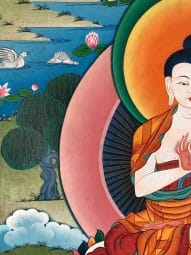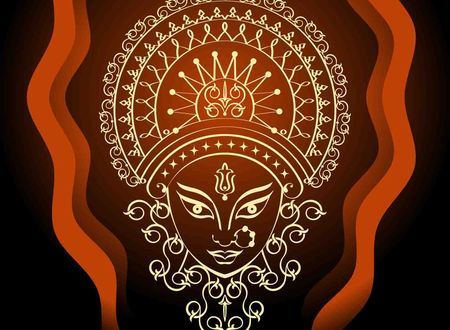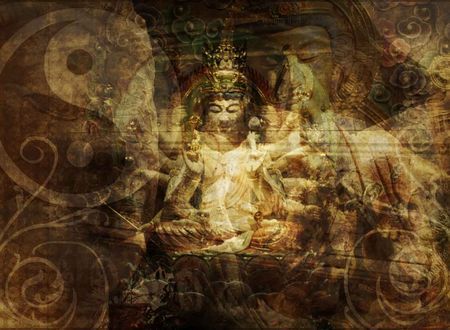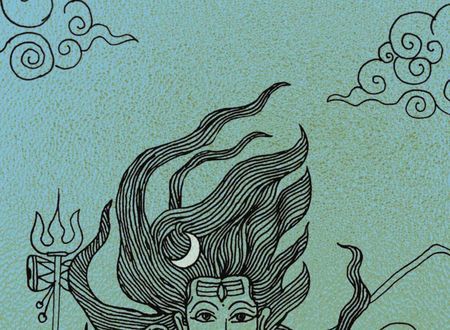The YouTube video deals with two questions at the start:
1) Little knowledge of Sanskrit inadvertently affects our pronunciation of the Mantras. Do they affect the efficiency of the Mantras?
2) Added to (1), if we do not know the meaning of the Mantras being chanted, will its benefits be any lesser?
Below is a summary of the thoughts of Om Swami Ji on the above questions.
 There are Mantras that are devoid of meaning. There is a difference between a Shloka and a Mantra. There are Mantras containing more than 20 words, e.g, the ‘Vishnu Sahastranam’, ‘Bhagavad Gita’ and ‘Lalitha Sahastranam’. Every word of those Mantras has profound meanings and interpretations. Words are the mirror of emotions. Once the meaning is understood, there is a flow of emotions. Any of the examples above might take up to 40 minutes in chanting. If the Mantras do not speak to you, then naturally you might fall asleep or your thoughts will drift away. The Mantras flow in the same rhythm so that everything sounds almost the same unless you understand what is being chanted.
There are Mantras that are devoid of meaning. There is a difference between a Shloka and a Mantra. There are Mantras containing more than 20 words, e.g, the ‘Vishnu Sahastranam’, ‘Bhagavad Gita’ and ‘Lalitha Sahastranam’. Every word of those Mantras has profound meanings and interpretations. Words are the mirror of emotions. Once the meaning is understood, there is a flow of emotions. Any of the examples above might take up to 40 minutes in chanting. If the Mantras do not speak to you, then naturally you might fall asleep or your thoughts will drift away. The Mantras flow in the same rhythm so that everything sounds almost the same unless you understand what is being chanted.
Mantras require time to study (it takes months or even years). You might spend an entire lifetime in the study of the first word of the Vishnu Sahastranam, ‘Vishvam’.
⊃⊂⊃⊂⊃⊂⊃⊂⊃⊂⊃⊂⊃⊂⊃⊂⊃⊂⊃⊂⊃⊂⊃⊂⊃⊂
‘Vishvam Vishnur Vashatkaro’
⊃⊂⊃⊂⊃⊂⊃⊂⊃⊂⊃⊂⊃⊂⊃⊂⊃⊂⊃⊂⊃⊂⊃⊂⊃⊂
He is the universe, He is the ‘Preserver and Destroyer’ of everything in this universe. No one knows whether Vishnu is in everything in this universe or whether the whole universe is in Vishnu. These three words alone can become a Mantra if you understand the purport of it. Understanding drives Bhakti into a stronger force. It is the path of understanding the divine. We all know the benefits of the Mantras as their purport have already been outlined. That’s the reason we are so keen on those mantras. The benefits speak to us. It is very easy to access translations of any scripture these days.
Sanskrit literacy versus Sanskrit-cultured? Having an acute knowledge of Sanskrit culture is so much more important rather than being Sanskrit literate.
___________________________________________________________
Question: Swami Ji had mentioned that in Surya (Sun) sadhana, water as a matter of principle should be offered on the Shiva lingam. A question by a member of the audience was, are there any added benefits if the water is offered to any of the 12 Jyotirlingas?
Emotions dictate our predisposition to our sadhana. During Shravan maas (5th month of Hindu calendar), yet-to-marry young women travel long distances to offer water to Shiva Lingams. It is unfortunate that during those voyages bad things tend to happen to those young women. In this case, wouldn’t it be advisable to offer water in a small temple rather than travelling for so long and upon reaching there the priest urges you to finish your prayer within seconds? How would you feel at that instant?
___________________________________________________________
Question: which is best, to recite or meditate on the Bhagavad Gita?
The mere contemplation and brainstorming of the Bhagavad Gita is a meditation upon itself.
___________________________________________________________
Question: How to purify the subconscious mind and heart?
Our subconscious mind is the repository of all our accumulated experiences. Purging it requires deep introspection. You have to go inside your mind and cleanse it from unwanted elements. The intrinsic journey must be silent. Thus, you would be able to open its door and step inside. If your mind is in a constant cacophony, you will be left fighting and time will slip by.
Samadhi is the state where the conscious mind becomes still and the subconscious mind is most active. “Where all thinking ends and only observation remains or a view remains where the view and the viewer become one and there is no duality”.
___________________________________________________________
Question: What is Nirvichara (without thought) Samadhi?
 Swami Ji elaborated saying that Samadhi is always without thoughts. The question might have been about Nirvikalpa Samadhi. Swami Ji narrates the story of the Centipede.
Swami Ji elaborated saying that Samadhi is always without thoughts. The question might have been about Nirvikalpa Samadhi. Swami Ji narrates the story of the Centipede.
A boy was walking in his shoes. He encountered a centipede.
“You have numerous legs! Where will you get so many shoes”?
The centipede replied that it was able to manage without.
The boy prompted further: “How do you walk with a hundred legs? Which one do you put first and how do you decide which comes next?”
Centipede replied: “Let me show you”. As the centipede began to think, it rolled to one side.
Centipede said, “Once I started thinking, I got confused. Which one first and then next? When I was not thinking about it and walking as per normal, then I was able to walk perfectly with my hundred legs”.
Nirvikalpa Samadhi is about being in sync with the universe.
We should abstain from being a control freak. Nirvikalpa means having no other option with nothing else left, not the yogi nor the practitioner.
The totality of ego has been broken.
Only pure Sadhak remains.
Please follow this link to access the video.










Comments & Discussion
9 COMMENTS
Please login to read members' comments and participate in the discussion.